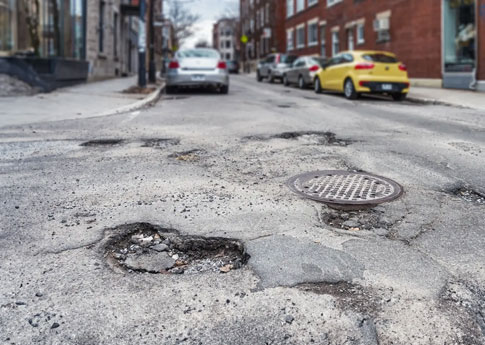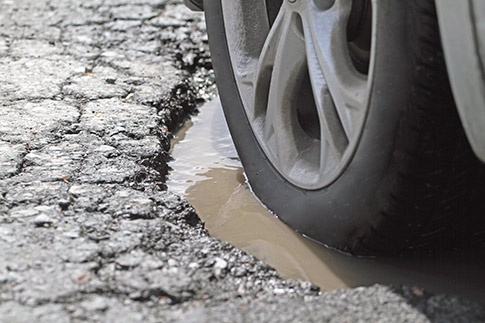Car damaged by a pothole accident: What are your options?

What to do if a pothole damages your vehicle? Flat tire, misaligned suspension, bent rim, and more—potholes can cause serious damage to your car and compromise vehicle safety. Learn about the possible damages, average costs of repair, and your options for getting compensation.
What damages can a pothole cause to your car?
Smaller wheel diameters increase the impact, and if the pothole is as deep as the tire, the risk is even higher. Impacts that hit the upper side of the tire can push forces upward and backward, possibly causing multiple damages.
Pothole damage: Common repairs and average costs
1. Tires
Tires take the initial shock. They can tear on the sidewall, break, or deform. A belt rupture poses serious safety risks. If the sidewall or tire structure is damaged, replacement is urgent.
Low-profile tires: especially vulnerable
Overinflated tires: risk of structural failure
Underinflated tires: risk of crushing between rim and pothole
Average tire replacement cost: $70–$400+ per tire, depending on size, brand, and quality. Winter tires are usually more expensive than summer tires in some sizes.
2. Wheels (rims)
A damaged wheel can bend, crack, or even break if the tire doesn’t absorb the full impact. Repairs are limited, and replacement is often required.
Replacement cost: $40–$200 for a steel rim; often over $500 for alloy (mag) wheels.
3. Suspension and steering
Strong impacts can damage control arms, tie rods, or misalign wheel alignment.
Replacement costs:
Control arm: $150–$350
Tie rod: $75–$250
Wheel alignment: $90–$200+, depending on damage severity
4. Shock absorbers
Potholes rarely break shocks immediately, but direct impacts can weaken them over time. Check for leaks or test rebound. A shock without visible oil isn’t necessarily in good condition.
Replacement cost: $50–$500+

“Quick test for shock effectiveness: Push down on a corner of the car two or three times, release, and observe. If it bounces more than once, the shock needs replacement. Repeat at all four corners.”
Sylvain LégaréResearch Analyst, Mobility, CAA-Quebec
5. Body and undercarriage
Long potholes can damage low parts of the car, such as body panels or bumpers, potentially costing over $1,000.
6. Hubcaps
Pressure-fitted hubcaps can easily fly off when hitting a pothole.
Replacement cost: $20–$150 per wheel
Collateral damage isn’t always immediately visible, so a mechanical inspection is important if your vehicle hits a pothole hard.
How to minimize pothole damage
Avoid braking inside the pothole.
Slow down just before the pothole and release the brakes before entering.
Hold the steering wheel firmly to avoid veering.
Keep a safe distance from the car in front to spot potholes early.
Don’t swerve dangerously to avoid a pothole.
What to do after hitting a pothole
Park safely and inspect your car (tires, rims, suspension, etc.).
Take photos of the damages and, if safe, the pothole itself.
Call a tow truck if the car seems unsafe to drive.
Don’t try to retrieve lost hubcaps or parts.
Report the pothole to your municipality or the Ministère des Transports (MTQ).
Schedule an auto inspection to assess repairs.
Legal recourse for pothole damage
Claims to a city or the Ministère des Transports
The Ministère des Transports du Québec (MTQ) and municipalities aren’t usually responsible for damage to tires or suspension caused by road conditions.
However, you may pursue claims for negligence or fault—but the burden of proof is on you.
Good to know: You can file a claim with a municipality, city, or government and go to court at the same time—don’t wait too long!
What is the deadline for filing a claim for damage caused by a pothole?
Recipient | Steps | Deadline |
|---|---|---|
Municipality or City | Written notice by registered mail to the city clerk | Within 15 days of the incident |
| Damages claims: Small claims court: ≤ $15,000 Superior courts: > $15,000 | Within 6 months of the event |
Ministère des Transports du Québec (MTQ) | Written notice online or by mail. | Prescription: 3 years (act as early as possible) |
| Damages claims against the Attorney General of Quebec – MTQ: Small claims court: ≤ $15,000 Superior courts: > $15,000 |
|
How to prove fault of an authority?
To prove negligence, recklessness, or fault on the part of the authority responsible for the pothole, you must demonstrate two things:
That the poor condition of the road (asphalt) had been reported to the authority before the incident.
That the authority was negligent in the actions taken to correct the situation.
How to build your case
Take photos of the pothole, the surrounding area, and the damages;
Estimate the size of the hole (depth and width);
Get a repair estimate for your damaged vehicle from a certified workshop, such as a CAA-Quebec Approved Auto Repair Service;
Gather your evidence: repair invoices, mechanical reports, complaints, witness statements;
Record the date, time, and weather conditions.
Good to know: Cities and different MTQ (Ministère des Transports du Québec) offices have complaint management systems. You can request a copy of the pothole complaint register for a given period from the relevant authority.
Vehicle ompensation is still possible even if you cannot prove negligence or fault of the responsible authority before a judge. Case law sometimes recognizes damages to rims, wheels, steering, and more. Consult judgments at citoyens.soquij.qc.ca.
A process that may pay off
Even though potholes are often considered normal road hazards, it is sometimes possible to receive compensation. Keep the right reflexes, carefully document your case, and above all, don’t wait too long to act.
Filing a claim with your auto insurance
You can file a claim with your auto insurance. However, check whether it is worth doing so, depending on the repair cost versus your deductible.
You may withdraw your claim even after the file is opened and repair costs are assessed.
However, a “closed without compensation” note will remain on your file in the central claims database (Fichier central des sinistres) of the Groupement des assureurs automobiles (GAA).

Benefit from personalized advice
Do you have questions about gas-powered or electric vehicles, driving, or need recommendations to find an Approved Auto Repair Service?

